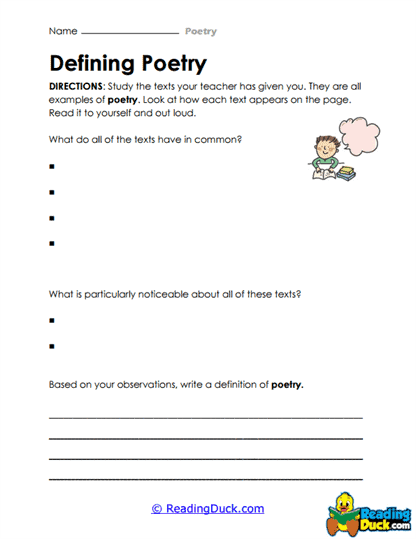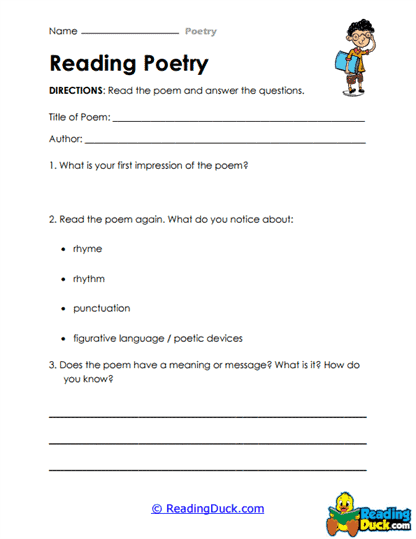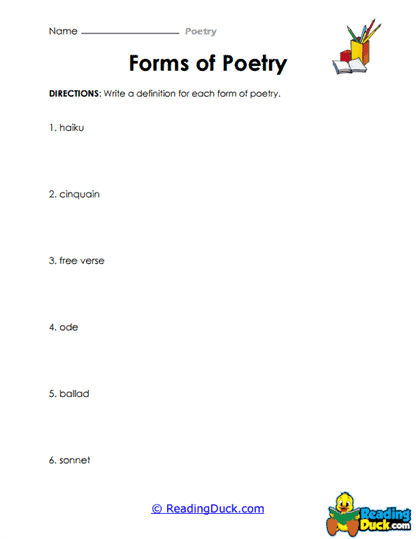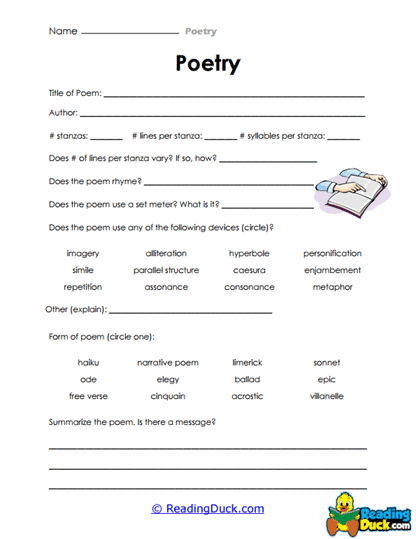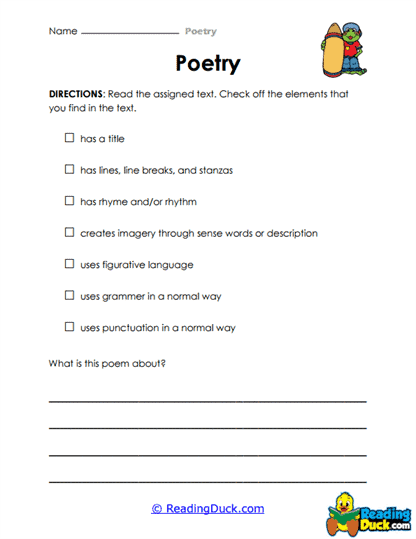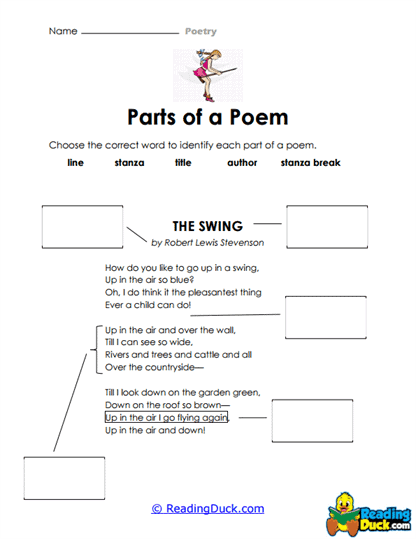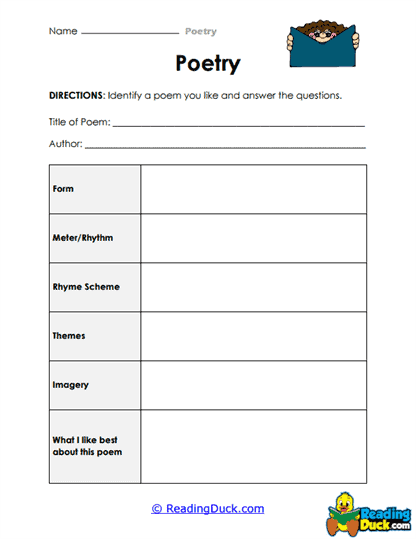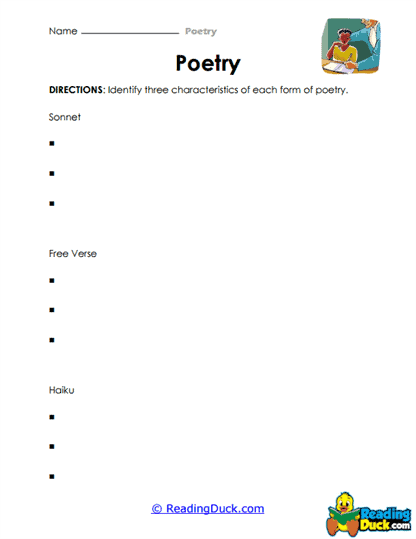Poetry Skills Worksheets
About Our Poetry Skills Worksheets
Our Poetry Skills Worksheets collection is designed to guide students through the intricacies of understanding, analyzing, and appreciating poetry. Poetry is a unique literary form that often requires specific reading strategies and a deep engagement with language, rhythm, and imagery. These worksheets offer structured activities that help students explore the elements of poetry while building their reading comprehension and critical thinking skills. Whether students are beginning to encounter poetry or are more experienced readers, this collection provides accessible, high-quality resources to improve their understanding of this art form.
Available in PDF format, the worksheets are easy to download, print, and distribute, making them perfect for both classroom and home use. Each worksheet includes a downloadable answer key, providing quick and effective feedback for teachers, parents, and students. By focusing on the core elements of poetry, these worksheets enhance students’ ability to interpret poems, identify literary devices, and connect meaningfully with the text.
Understanding Poetry: Elements and Techniques
Poetry is often described as a condensed form of language that uses sound, rhythm, and imagery to express ideas, emotions, and stories. Unlike prose, poetry emphasizes the aesthetic qualities of words, making it a complex but rewarding literary form to study. Our Poetry Skills Worksheets help students break down the core elements of poetry, allowing them to grasp the structure, form, and meaning behind the lines.
Through these worksheets, students explore key aspects of poetry, including:
- Rhythm and Meter: Understanding the pattern of stressed and unstressed syllables in a poem helps students appreciate the musicality and flow of the text.
- Rhyme Schemes: Students learn to identify different rhyme schemes, such as AABB, ABAB, or free verse, and how these patterns contribute to the poem's structure and tone.
- Imagery and Sensory Details: Students explore how poets use descriptive language to create vivid images that appeal to the senses, enhancing the emotional and visual experience of the reader.
- Figurative Language: The worksheets guide students in recognizing and analyzing poetic devices like simile, metaphor, personification, and alliteration, helping them to uncover deeper meanings in the text.
For example, students might analyze a classic poem by Robert Frost, identifying the rhyme scheme and discussing how the imagery evokes a specific mood or theme. This kind of structured exploration helps students build confidence as they decode and interpret poetic language.
Building Core Reading Comprehension and Critical Thinking Skills
Our Poetry Skills Worksheets serve as powerful tools for building core reading comprehension and critical thinking skills. Poetry, with its often complex language and layered meanings, challenges students to think deeply and make connections between words, ideas, and emotions. These worksheets offer targeted practice in analyzing poetry, helping students become more skilled readers who can engage critically with a variety of texts.
The worksheets help students:
- Identify Main Ideas and Themes: Students learn to distill the core message or theme of a poem, focusing on how specific lines or stanzas contribute to the overall meaning.
- Analyze Literary Devices: By exploring the use of metaphors, similes, and other figurative language, students develop a deeper understanding of how poets convey abstract ideas and emotions.
- Develop Interpretative Skills: The worksheets encourage students to interpret the multiple layers of meaning in a poem, fostering critical thinking and analysis.
For example, after reading a poem that uses extended metaphor, students might be asked to explain how the metaphor shapes their understanding of the poem’s message. This activity enhances their ability to interpret complex texts and make thoughtful, evidence-based conclusions.
Supporting Foundational Literacy Skills for Younger Learners
For younger students or those in need of literacy reinforcement, our Poetry Skills Worksheets offer targeted support in developing foundational reading skills. Poetry, with its focus on sound and rhythm, is an excellent medium for helping students improve decoding, phonemic awareness, and fluency. These worksheets are designed to introduce students to poetry in a way that is accessible and engaging, building a strong foundation for more advanced literacy skills.
The worksheets help early learners:
- Develop Phonemic Awareness: By focusing on rhyme and rhythm, students practice recognizing sound patterns, which is crucial for improving decoding skills.
- Build Fluency: Repeated reading of poetry encourages students to practice reading with expression, pacing, and accuracy, enhancing overall fluency.
- Enhance Sentence Structure Awareness: Poetry often plays with sentence structure and word order, helping students become more flexible in their understanding of grammar and syntax.
For example, younger students might work on a worksheet that focuses on nursery rhymes, identifying rhyming words and practicing reading aloud. This reinforces their phonemic awareness while making the reading process enjoyable and interactive.
Integrating Poetry into a Comprehensive Literacy Curriculum
Our Poetry Skills Worksheets are designed to be versatile tools that can fit seamlessly into any comprehensive literacy curriculum. Whether used as standalone resources or incorporated into larger lesson plans, these worksheets provide valuable practice in analyzing poetry and developing language arts skills. Teachers and parents can use these worksheets to introduce students to the beauty and complexity of poetry, while also reinforcing broader reading and writing goals.
The worksheets can be integrated into the curriculum in several ways:
- Standalone Poetry Practice: Teachers can assign worksheets to help students focus on specific poetry skills, such as identifying rhyme schemes or analyzing figurative language.
- Supplemental to Literature Lessons: These worksheets can be used to complement lessons on specific poems, helping students apply what they’ve learned about literary devices and poetic structure.
- Cross-Curricular Use: Poetry is not limited to the language arts classroom. These worksheets can also be used in subjects like history or science, where students explore historical or scientific concepts through poetry.
For example, after reading a poem by Langston Hughes, students might use a worksheet to analyze the social and historical context of the poem, deepening their understanding of both the text and the period in which it was written. This cross-curricular approach helps students connect poetry to broader learning themes.
Versatile for Traditional and Digital Learning Environments
Our Poetry Skills Worksheets are adaptable to both traditional and digital learning environments, making them a flexible resource for any classroom setup. Available in PDF format, these worksheets are easy to print for in-class use or share digitally for remote learning scenarios. This ensures that teachers and parents have access to high-quality materials that support student learning, no matter where the instruction takes place.
The worksheets are ideal for:
- In-Class Instruction: Teachers can distribute printed worksheets for individual or group work, allowing students to explore poetry in a collaborative or independent setting.
- Remote Learning: The PDF format makes it simple to upload the worksheets to learning management systems (LMS) like Google Classroom or Microsoft Teams, enabling students to complete assignments at home.
- Hybrid Learning: For hybrid models, these worksheets provide consistency across different learning environments, ensuring that all students have access to the same high-quality content.
This adaptability makes our Poetry Skills Worksheets a practical choice for educators and parents seeking reliable and effective resources to enhance student engagement with poetry.
Encouraging Project-Based Learning and Real-World Applications
Our Poetry Skills Worksheets not only help students analyze poetry but also encourage project-based learning, where students apply their skills in creative and real-world contexts. By engaging in project-based activities, students can use poetry as a springboard for further exploration, whether through writing their own poems, analyzing poetry from diverse cultures, or integrating poetry into other subject areas.
Some examples of project-based learning supported by these worksheets include:
- Creative Writing Projects: After analyzing the structure and devices used in various poems, students can write their own poems, using techniques like metaphor, rhyme, and meter.
- Cross-Curricular Poetry Projects: In subjects like social studies or science, students could explore poems related to historical events or scientific phenomena, analyzing how poets use language to describe real-world topics.
- Poetry Recitation and Performance: Students might select a poem to memorize and perform, focusing on expression and intonation, which enhances their fluency and comprehension.
For instance, after studying the poetic techniques of Maya Angelou, students could be tasked with writing a poem about personal resilience, using figurative language to express their ideas. This project-based approach allows students to connect poetry to their own experiences and apply their reading skills in creative ways.
Conclusion
Our Poetry Skills Worksheets offer a rich, accessible, and versatile resource for educators, parents, and students. With a focus on key poetic elements such as rhyme, meter, figurative language, and imagery, these worksheets help students develop their reading comprehension, critical thinking, and literacy skills. Available in convenient PDF format, these worksheets are perfect for both traditional classroom use and digital learning environments.
By incorporating poetry into a comprehensive literacy curriculum, these worksheets provide students with the tools they need to engage deeply with this unique literary form, whether through independent study or project-based learning. From younger students learning to recognize rhyming words to more advanced readers analyzing complex poetic devices, our Poetry Skills Worksheets support the development of a wide range of reading and writing skills, making poetry an accessible and rewarding subject for all learners.
